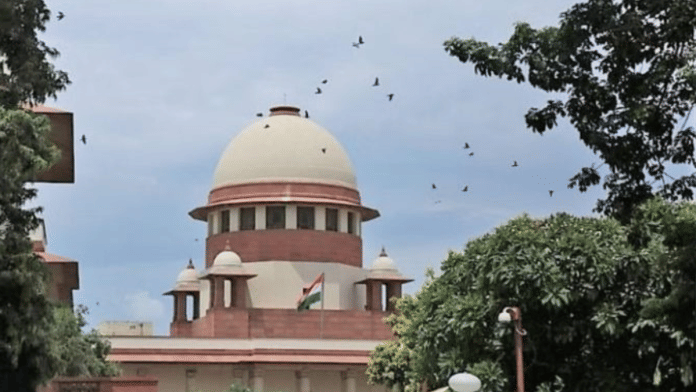New Delhi: The Supreme Court has set aside the death sentence of a murder convict after finding glaring procedural lapses in his trial. These omissions, which cast a doubt over the trial, included changing the convict’s legal aid counsel at a belated stage—multiple times—and examining witnesses in his absence.
While acquitting the man from Uttar Pradesh, who was sentenced to death for killing his wife and 12-year-old daughter, the top court said that even persons accused of committing the most heinous crimes are entitled to basic protection under law.
“To us, the imposition of the death penalty here appears fraught with danger and should not be sustained,” the court said, setting aside the man’s conviction in the case and asking him to proceed to the trial court, which would hear the case afresh.
Taking note of the lapses in the trial, a three-judge bench of Justices Vikram Nath, Sanjay Karol and Sandeep Mehta said, “Ending someone’s life is, in fact, one of the gravest crimes that a person may commit, and so even here the accused is entitled to the protection of law ensuring that the process that condemns him as ‘convicted of an offence’, is free of procedural irregularities and blemishes, which may call into question the credibility of the conclusion arrived at by such a process.”
Flagging that over a period of 2.3 years, the matter was adjourned 52 of the 74 times that it was listed, the court concluded that in such a case, the examination of witnesses and smooth conduct of a trial are “essential”, which were given a “go-by”.
Also Read: In 2024, most death sentences handed out by Indian courts were for murder, not sexual offences
The case & conviction
The prosecution’s case was that on the intervening night of 29-30 June, 2014, the accused had returned home in an inebriated state, carrying two bottles of liquor, which he consumed along with his father.
Shortly after, a quarrel ensued between them, which led to the accused slapping the father and injuring his ear. Subsequently, the accused, Sovaran Singh Prajapati, had asked his wife for money to get more liquor and was denied the same, leading to him thrashing, abusing and eventually killing her, along with his 12-year-old daughter.
The trial court convicted the man on 28 February, 2017 and imposed capital punishment on 1 March, 2017 for the offence of murder and causing the disappearance of evidence, or giving false information to shield the offender, under Sections 302 and 201 of the Indian Penal Code (IPC), while saying that the prosecution had proved its case beyond reasonable doubt.
The sentence of death by hanging was also handed out to Sovaran for the offence of murder, along with a seven-year imprisonment for causing the disappearance of evidence.
On 1 October, 2018, the Allahabad High Court confirmed the conviction and sentence imposed on the man by the trial court, while noting that the post-mortem had found injuries on the dead wife and the daughter, like a blackened eye, a lacerated wound and multiple abrasions.
SC’s ruling & importance of fair trial
In its 4 February ruling, the court flagged several issues with the case, such as inadequate legal representation of the accused and his absence when prosecution witnesses were being interviewed.
It asked, “Was his case effectively argued? Were all the possible gaps in the prosecution case sufficiently explored and exploited to his advantage? Were the prosecution witnesses ably cross-examined leading to the creation of a reasonable doubt, wherever possible?”
Underlining that it is important to reiterate the purpose of a trial, which is “a fact-finding exercise wherein both parties, i.e., the prosecution and defence, after investigation by the competent authorities, present their versions of events”, the court added that its role and duty is to determine the truth.
When a trial is being conducted, the court must not only look for evidence, but also ensure that the rights of the accused are balanced against the demand for justice, the apex court said.
It cited the second edition of American Jurisprudence (2007) to say, “The objective is to secure a fair and impartial administration of justice between the parties to the litigation and not the achievement of a hearing wholly free from errors.”
The court also highlighted the guarantee of a free and fair trial given to citizens under Article 21 (Right to Life), and said, “Fair and impartial administration of justice is a treasured right protected by various enactments of law, including, first and foremost, the Constitution, which under Article 21 guarantees the Right to Fair Trial.”
Relying on the three-judge bench ruling in Vinubhai Haribhai Malaviya vs State of Gujarat (2019), the court said that the ultimate aim of all investigation and inquiry, whether by the police or by the magistrate, is to ensure that those who have actually committed a crime are correctly booked, and “those who have not are not arraigned to stand trial”.
(Edited by Mannat Chugh)
Also Read: SC-laid guidelines overlooked? HCs looked at mitigating factors in 19.4% of death penalty cases only






